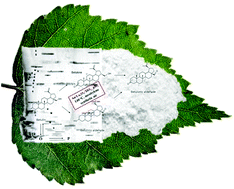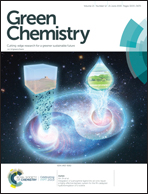Oxidation of a wood extractive betulin to biologically active oxo-derivatives using supported gold catalysts†
Abstract
Betulin (90–94%) was extracted from birch with a non-polar solvent and recrystallized from 2-propanol. Liquid-phase oxidation of betulin aimed at obtaining its biologically active oxo-derivatives (betulone, betulonic and betulinic aldehydes), exhibiting e.g. antitumor, anti-inflammatory, antiparasitic, anticancer and anti-HIV properties, was demonstrated for the first time over gold-based catalysts. Gold was deposited on pristine TiO2 and the same support modified with ceria and lanthana, followed by pretreatment with a H2 or O2 atmosphere. The catalysts were characterized by XRD, BET, ICP, TEM, XPS, DRIFT CO, TPD of NH3 and CO2 methods. The nature of the support, type of modification and the pretreatment atmosphere through the metal–support interactions significantly influenced the average particle size of gold, its distribution and the electronic state of gold, as well as the acid–base properties and, thereby, the catalytic performance (activity and selectivity) in betulin oxidation. Au/La2O3/TiO2 pretreated in H2 displayed the highest catalytic activity in betulin oxidation among the studied catalysts with selectivities to betulone, betulonic and betulinic aldehydes of 42, 32 and 27%, respectively, at 69% conversion. Side reactions resulting in oligomerization/polymerization products occurred on the catalyst surface with the participation of strong acid sites, diminishing the yield of the desired compounds. The latter was improved by adding hydrotalcite with the basic properties to the reaction mixture containing the catalyst. Kinetic modelling through numerical data fitting was performed to quantify the impact of such side reactions and determine the values of rate constants.



 Please wait while we load your content...
Please wait while we load your content...